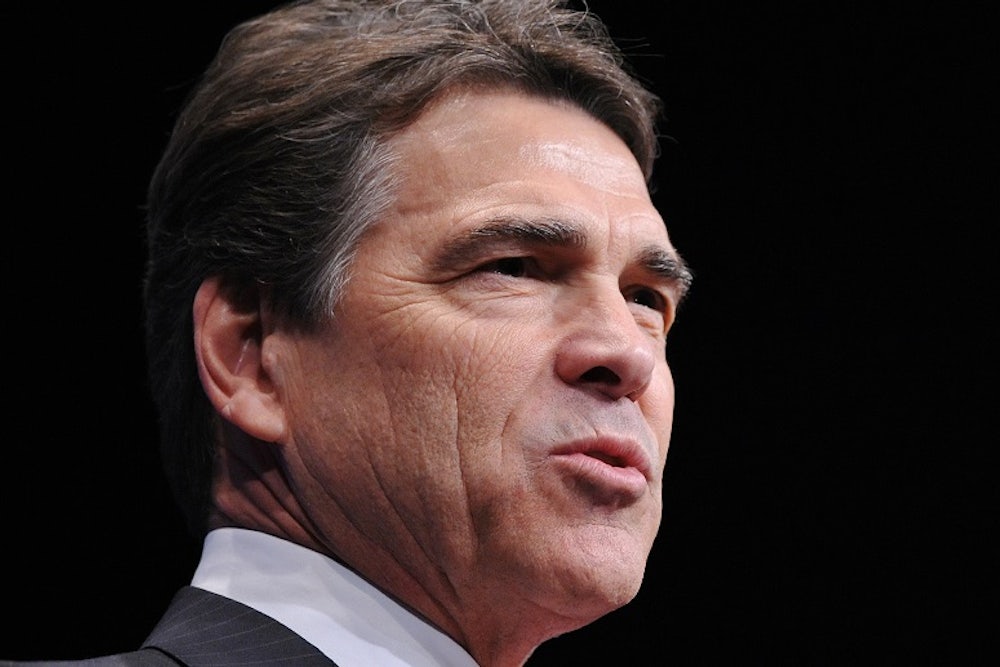As he smiled for his mug shot Tuesday, Texas Governor Rick Perry showed little concern about his felony charges for abuse of power. He even enjoyed some ice cream afterwards.
Most commentators, on the left and right, seem to agree that Perry has little to fear. New York’s Jonathan Chait called the charges “outrageously unfair.” David Axelrod agreed, calling them “pretty sketchy.” Conservatives, meanwhile, have rallied around the Texas governor. On Red State yesterday, he was declared the frontrunner for the Republican presidential nomination. All in all, this indictment seem to be working out pretty well for Perry.
But baked into all this positive media coverage is a big assumption: that the case against Perry will fall apart. Of course, there’s no guarantee that will happen, especially because we still don’t know many details of the case—specifically, the evidence and testimony presented to the grand jury.
What we do know is this: In April 2013, Rosemary Lehmberg, the district attorney in Travis County, pleaded guilty to drunk driving and was sentenced to 45 days in jail. Perry called for her resignation, but Lehmberg refused. In response, the governor threatened to veto funding for the Public Integrity Unit, a division of the Travis County District Attorney’s Office that investigates fraud among Texas politicians. It was reasonable for Perry to demand Lehmberg’s resignation after her arrest, but he also had ulterior motives: He would get to pick her replacement, one that could look more favorably on him and his Republican colleagues. But Lehmberg still declined to resign, forcing Perry to follow through on his veto threat.
We also know that this isn’t a political witch hunt. A Republican judge assigned the special prosecutor, Michael McCrum, to the case. And McCrum is no Democratic loyalist. He was a federal prosecutor in the George H.W. Bush administration and had the support of Senator John Cornyn and former Senator Kay Bailey Hutchinson, both Republicans, to become the U.S. Attorney for the Western District of Texas. (He eventually withdrew his nomination.)
So, why is he bringing this case, if it is so obviously flawed? We don’t know yet, because we haven’t seen the evidence. But one answer could be that it isn’t actually flawed. Perry is already walking a fine line here. Few would argue that it’s inappropriate for him to use his executive power as leverage to extract concessions from Democrats, particularly given Lehmberg’s arrest. But if he used it to install a Republican that would block corruption investigations of his political allies, that “would be a lot more serious,” as Axelrod noted Tuesday. And that may not be farfetched: As The New Republic’s Alec MacGillis wrote Sunday, that fits with Perry’s modus operandi. There are also reports that Perry’s aides offered to restore the Public Integrity Unit’s funding if Lehmberg resigned—and then find her another high-paying job in the District Attorney’s office. If that proves true, it could be damming.
For his part, Jeffrey Toobin, a legal analyst for the New Yorker, thinks Perry is in trouble. “What Perry did was obvious,” he wrote yesterday. “The Governor was using his leverage to jam a political adversary—not exactly novel behavior in Texas, or most other states.” Perry’s problem, Toobin writes, is that his actions, while widely used, may be technically illegal under Texas law. Once prosecutors bring the case, he argued, “courts respond to the argument that “everyone does it” more or less the same way that your mother did. It’s no excuse.”
Given all of this, it seems clear that the national press has written off these charges prematurely. We’ll have to await the actual evidence to know for sure. If it’s weak, Perry could receive a nice national bounce as the primary season nears. But if not, Perry’s mug shot could be the last time he’s smiling for quite a while.
—Danny Vinik
Other news from Tuesday:
FERGUSON: At least 47 people were arrested Tuesday night as protests continued in Ferguson. However, the police did not use tear gas and no one threw any Molotov cocktails, according to Captain Ron Johnson. More protests are planned for Wednesday morning. (Alan Blinder and Campbell Robertson, New York Times)
HEALTH CARE: Newly released data suggests that health care prices are still rising at historically low rates. As Adrianna McIntyre explains, that's good news for Obamacare—and for every American who has to pay medical bills. (Vox)
OBAMACARE: Want proof the issue is losing its political bite? Republicans aren't making it a focus of their attack ads anymore. (Heidi Przbyla, Bloomberg)
BORDER CRISIS: A Honduras morgue director told the Los Angeles Times that between five and ten migrant children deported from the U.S. have been killed since February. In that time, the morgue has seen 42 dead children. (Esther Yu-Hsi Lee, ThinkProgress)
DROUGHT: Los Angeles is adding additional inspectors to issue citations to water-wasters as California’s drought worsens. They may need more than just manpower: Out of 1,400 reports of water violations, not a single person has yet been fined. (Los Angeles Times)
Articles worth reading:
Politicize Ferguson? Absolutely. Paul Waldman wants liberals to seize on the controversy, in order to focus public attention on issues like inequality and the militarization of the police. (The Plum Line)
We need more people to examine dead bodies. Seriously, there's a shortage of qualified pathologists and medical examiners. Read Tara Culp-Ressler for details. (ThinkProgress)
Local isn’t always better: Paul Ryan argued that events in Ferguson should be decided by local law enforcement who have the most “expertise.” Yes, the same local law enforcement that have made one mistake after another the past week. (Digby)
Stories we’ll be watching:
Attorney General Eric Holder heads to Ferguson today. The Federal Open Market Committee will release the minutes of its July meeting at 2 p.m.
At QED:
Danny Vinik argues that Obama was too soft on the Ferguson police force in his speech Monday. Also, check out Noam Scheiber's piece on Uber hiring former Obama campaign manager David Plouffe.
